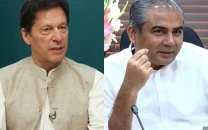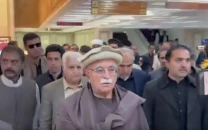Suicide: Embracing the reaper
Age, sex, profession and economic status are no bar when it comes to taking your own life.

Suicide: Embracing the reaper
“There are so many cases of suicide these days,” she says. A junior doctor at JPMC, she estimates that, on any given day, at least 15 cases of attempted suicide arrive at the poison centre. According to her, thirty per cent of them die despite the best attempts of the doctors. “Like the case you just saw a few moments back, sometimes it really is too late to do anything to save the patient. They barely have a pulse when they arrive,” she says.
Most of the patients who land up at Jinnah Hospital come from lower to middle income backgrounds. They attempt suicide mostly by consuming pesticides, rat poison, bleach or overdosing on drugs.
The young doctor — insisting that this Wednesday is an unusually slow day — shows me around the monitoring room where at least a dozen women are struggling for life. Their hands and feet are tied to the steel rings of their beds with strips of cloth. “We do that to keep the patient from taking their own lives or running away,” says Dr Mohammad Inam, a senior doctor at the centre.
The patients aren’t allowed to go to the bathroom during recuperation, a period which lasts a minimum of one week. Urinal bags hang by their beds and diapers are fixed around their buttocks, many of them heavy with faeces. Many of them refuse to eat and are force-fed through tubes going through their noses and mouths.
In some extreme cases, a sedative injection is given after every fifteen minutes, says Inam. Many patients also end up hallucinating during the treatment period due to the combination of drugs, trauma and immobility.
In one corner of the room lies a young child, barely 12 years old. According to his case file, he has consumed pesticides in an attempt to end his life. The child tells the doctor that he was upset at being scolded and beaten by his father.
Strangely, there are no attendants with any of the patients this afternoon. “Attendants are not allowed because it would be very difficult for them to witness the recovery procedures adopted here,” says Inam. Also there have been times when attendants have attacked or threatened the doctors on duty when the patients die.
Dr Fauzia, who has been at the poison centre for more than a year, has conducted a case study of over 1200 patients since 2008. According to her, the numbers are increasing and most of the cases are women, many of them married with children. “But I am more concerned about the number of teenagers and children who are arriving almost everyday,” she says.
Doctors say that most of the time the patient’s family prevaricates about the reasons why their loved ones attempted suicide. Many say it was an accident or that the victim had consumed the poison by mistake.
According to the medico-legal officers at Jinnah hospital, though attempting suicide is an offence under the law, almost none of the victims at the hospital are actually charged with a crime. “They and their families are already suffering. The last thing they need is a police-waala charging the victim.”
Doctors, however, allege that that is just one part of the story. The truth is that policemen and MLOs have their own arrangements for such cases and threaten families with dire consequences if they don’t pay bribes. “No matter how poor you are, you pay the bribe to not be formally charged,” says a doctor, who has witnessed many such dealings.
In any case, all attempted suicides are recorded with the MLO. This record becomes crucial when the patient expires. Many a times, the families then come to the hospital to get the record and get a murder case registered. For example, if a married woman dies, her parents usually accuse the husband of forcing her to take poison.
Doctors at the centre say some days are just freaky. “There have been times when more than 25 patients have landed at the centre in a single day,” says Inam. This can be a huge problem since the capacity in the monitoring room is for just around a dozen patients.
Although there are treatments for most of the pesticides and rat poisons that are available in the market, according to a doctor at the centre, there is one particular strain of pesticide that always kills the person no matter what you do. “Truth is nobody really knows much about this strain due to lack of research, so how can a doctor expect to save a patient who has taken it,” he said.
Demand if you do
Under section 325 of the Pakistan Penal Code, attempted suicide is categorised as a criminal offence punishable with one year of imprisonment and/or a fine.
Call for help
The non-profit organisation MIND took the initiative of setting up a suicide helpline in April this year but the ‘24 hour’ hotline is currently functional only from 9 am to 3 pm. Working for the welfare of people with mental illness in rural areas since 1991, MIND took this step in response to the increasing number of suicides. But with only two trained ‘psychologists’ manning the hotline, repeated phone calls went unanswered. One can only imagine how a clinically depressed person on the verge of suicide would react to this, but according to the organisation’s administrator, Mr Kashif, MIND’s main concern was the publicity of the number (042-3576-199) so that more people could call in and benefit from their services.
Under pressure
March 28 was a busy Monday for Salman Baloch, the principal of Dawood College of Engineering and Technology (DCET). In the morning, Baloch had meetings with two different student action committees. In the afternoon, he went up to the third floor of the building. As the students and teachers went in and out of the university, absorbed in routine tasks, Baloch hurtled down, his head cracked on the ground and he died almost immediately.
At first there was some confusion about whether the professor may have slipped by accident or was pushed off but investigation officer sub inspector Zia Hussain Shah said that his team concluded that it was indeed a suicide. “All that needs to be established now are the exact circumstances surrounding the suicide,” says Shah.
The post mortem report concluded that the 58-year-old suffered multiple fractured bones in the chest and legs. The principal also had diabetes, hypertension and heart problems and perhaps more significantly, he was not happy with the administrative issues and environment at his college. Shah says that the principal was under a lot of pressure from the various student unions on campus. At one point, he had asked to be relieved of his duties as college principal.
College principals at public institutions like DCET come under enormous pressure from student bodies and it is not uncommon for senior teachers to be threatened, harassed and in some cases physically attacked by students affiliated with such bodies. In most cases, the pressure is to give passing grades to politically connected students even when their performance is poor.
“Baloch had two meetings with student action committees in the morning before he killed himself. I’m still investigating what kind of pressures the principal was facing,” the officer said.
The price of love
When love beckons, answer its call, says Rumi.
When Beenish, a 21-year-old Kashmiri girl, fell in love with 22-year-old Kaleemullah, however, their families decided that the match was inappropriate. The caste difference — Kaleem, an Awan from Sheikhupura — was unacceptable to the girl’s family.
Both came from educated and relatively well off families in Islamabad. She was pursuing her BBA, while he appeared for his MBBS examinations. The two had an entire lifetime’s worth of happiness to look forward to.
But on January 19, after her tuition classes, Beenish headed to the airport instead of back home as usual. There she met Kaleem and the two took the next flight to Karachi. This was the girl’s first visit to Karachi and Kaleem wanted to show her around: they visited the city’s landmarks and dined out, even stopping at Hotel Mehran before finally checking into the Beach Luxury hotel.
But this was no ordinary lovers’ tryst.
The next morning, the couple didn’t pick up the hotel management’s continuous calls, neither did they respond to the banging on the door of their room. Finally, the police was called in, and when the door was opened, the couple was found unconscious in each others arms. Empty bottles of sleeping pills lay on the floor. According to Investigation Officer Mushtaq Ahmed, one could feel a faint pulse on Kaleem, but it was too late to save Beenish. She was gone.
The police transferred them to Civil Hospital immediately. The Medical Legal Officer Dr Karrar Abbasi says they pumped the stomachs of the couple and while Kaleem began responding to the treatment, Beenish was declared dead on arrival.
“I didn’t have the heart to tell the young man that the love of his life was dead,” says Abbasi, who lied to Kaleem once he regained consciousness, telling him that Beenish was still in the intensive care unit. “He kept on asking us how Beenish was, whether she was still alive? ‘If not, then please don’t let me live,’ he would say.”
The next day, Abbasi asked the young man why they did it. “He said they had no other option. Their families would never give in and that was the only way.”
Beenish’s body was handed over to her family after postmortem. The police, on behalf of the state, filed a charge of attempted suicide against Kaleem at Jackson police station in Karachi. Kaleem was at the police station for 24 hours before being presented before a judicial magistrate and was granted bail after paying Rs 50,000. His family took him to Sheikhupura, where he recuperated.
However, the tragic tale does not end there. Investigators from Islamabad, where the case has been transferred to the Sihala police station by the girl’s family, also came to Karachi and the police team has now arrested Kaleem and charged him with murder.
Sub Inspector Ahmed, while saying that family members from both sides admitted that they were bent against the marriage, had no answer about why Kaleem would intentionally kill the only person he professed to love.
“Committing suicide for love is not new. But what’s rare is to find two individuals from educated backgrounds deciding to end their lives together,” says Ahmed who has worked in this field for 30 years. On the other hand, he says, he has come across numerous cases when a man or woman has committed suicide after being rejected by the person they love.
Dr Abbasi agrees with Ahmed, noting the differences in the way people from different classes of society commit suicide. “Usually the poor from rural areas die after consuming poison or hanging themselves. It is the educated middle and upper classes who use sleeping pills,” he says, recalling a case in Defence a few years when a young girl had committed suicide by injecting fatal doses of poison into a drip.
Despite the shroud of silence surrounding the issue of suicide, newspapers frequently report stories of spurned lovers who end up committing suicide.
On April 10, another couple committed suicide in Faisalabad. Waqar married Shumaila a few months back and the two lived in Sharif Pura, Peoples Colony No 2. However, since Waqar’s family didn’t approve of the match, the two were constantly threatened. Eventually, they both drank highly toxic pesticides to free themselves from their daily misery.
What does religion say about suicide?
Islam
Suicide is expressly forbidden in Islam, and suicides are condemned to torment, repeating the same action by which they killed themselves for all eternity. The relatively recent phenomenon of suicide bombings is considered unlawful by the majority of orthodox scholars and is considered quote separate from martyrdom.
Christianity
According to the Catholic tradition, suicide is a mortal sin. A person who commits suicide, according to the Church, will go to hell unless there were mitigating circumstances such as mental illness. A suicide victim is traditionally refused a Christian burial by the Catholic Church. Some Protestant churches tend to view suicide as ‘self-murder’, equating the sin incurred by committing suicide to the sin incurred by committing murder
Hinduism
Most schools of Hindu thought consider suicide to be a setback in the soul’s journey towards spiritual progress and eventual enlightenment. In Hinduism, the act of suicide is tantamount to evading the responsibilities of life and may result in rebirth ion a lower form or being forced to suffer through the same. However, the practices of Sati and of Prayopravesa (non-violent fasting to death) are allowed under certain circumstances.
Sikhism
Sikh religious scholars reject suicide as constituting interference in God’s plan. Suffering is said to be part of the operation of karma, and human beings should not only accept it without complaint but act so as to make the best of the situation that karma has given them.
Zoroastrianism
In Zoroastrian belief, suicide is a major sin, which will result in the soul being doomed to wander in a limbo state for all eternity, never reaching any destination.
Published in The Express Tribune, Sunday Magazine May 22nd, 2011.


















COMMENTS
Comments are moderated and generally will be posted if they are on-topic and not abusive.
For more information, please see our Comments FAQ